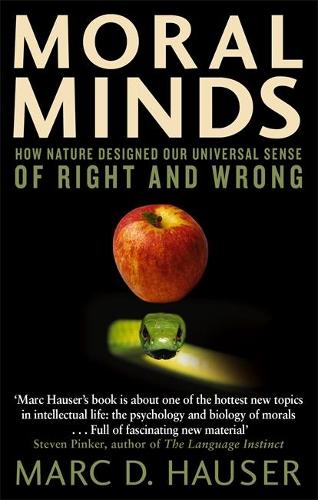
Moral Minds: How Nature Designed Our Universal Sense of Right and Wrong
(Paperback)
Publishing Details
Moral Minds: How Nature Designed Our Universal Sense of Right and Wrong
By (Author) Marc Hauser
Little, Brown Book Group
Abacus
1st June 2008
United Kingdom
Classifications
General
Non Fiction
Cognition and cognitive psychology
153.8
Physical Properties
Paperback
560
Width 201mm, Height 133mm, Spine 37mm
372g
Description
Now in B format.
A ground-breaking book that will do for morality what THE LANGUAGE INSTINCT did for language.Temptation and control are like two players in an arms race, displaying competition like that between predators and prey, parasites and hosts, and Americans and Russians during the Cold War. In this book, brilliant Harvard academic Marc Hauser evaluates recent developments in evolutionary biology, cognitive science, developmental psychology, economics and anthropology to provide a new way of understanding the tension between temptation and control. In our own species, this battle is waged at multiple levels: among genes housed in the body, between different areas of an individual's brain, between individuals within a group or between different groups - from small scale family feuds, to inter-tribal warfare, to coalitions among nations states. Drawing on the most up-to-date research and myriad cultural references from Shakespeare and Dostoevesky to Spielberg and the Coen brothers and Calvin and Hobbes, Hauser shows us the roots of cheating, greed, promiscuity and violence in an enthralling and important new work of popular science.Reviews
'The theory set out in MORAL MINDS is certainly intriguing. It could yet remap the way moral philosophers think' THE TIMES 'This book describes many fascinating findings from a wide range of psychological experiments' INDEPENDENT 'Hauser's theory ... has implications for everything, from the personal - our levels of guilt, how we judge others or respond to temptation - to religion, ethics and the law. The results are far-reaching and fascinating' PSYCHOLOGIES MAGAZINE
Author Bio
Marc Hauser is a full professor in the Department of Psychology and the Program in Neurosciences at Harvard University, a Harvard College Professor, adjunct Professor in the Graduate School of Education, and a Co-Director of the Mind, Brain and Behaviour Program at Harvard.
Author Location: New York, USA